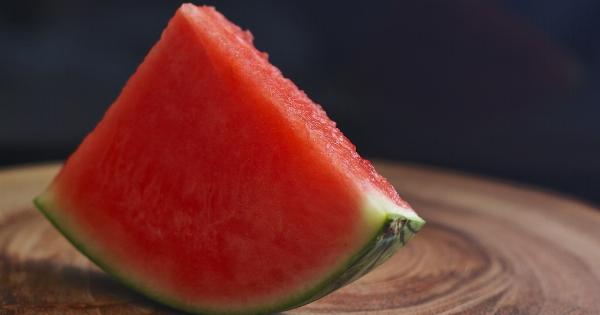Watermelon, with its juicy and refreshing taste, is a favorite fruit for many. Not only is it a delicious summer treat, but it also offers numerous health benefits.
One significant advantage of watermelon is its potential in reducing the risk of heart disease. Heart disease is a prevalent condition that affects millions of people globally, and finding natural ways to prevent it is crucial. In this article, we will explore the various ways watermelon can help decrease the risk of heart disease.
1. Rich in Lycopene
Lycopene is a powerful antioxidant that gives certain fruits and vegetables their vibrant red color. Watermelon happens to be an excellent source of lycopene, making it beneficial for heart health.
Studies have shown that lycopene can help prevent heart disease by reducing inflammation and oxidative stress in the body. Additionally, it may also help lower LDL cholesterol levels, known as the “bad” cholesterol that can contribute to heart issues.
2. Aids in Blood Pressure Regulation
High blood pressure is a significant risk factor for heart disease. Consuming watermelon regularly may help manage blood pressure levels due to its high potassium content.
Potassium is a mineral that helps regulate blood pressure by counteracting the effects of sodium and relaxing blood vessel walls. Including potassium-rich foods like watermelon in your diet can contribute to better blood pressure control and, consequently, a reduced risk of heart disease.
3. Supports Hydration
Staying properly hydrated is essential for maintaining overall health, including heart health. Dehydration can strain the heart by causing it to work harder to pump blood.
Watermelon, as the name suggests, contains a significant amount of water, approximately 92% per serving. By adding watermelon to your diet, you can increase your fluid intake and support proper hydration, reducing the burden on your heart.
4. Source of Vitamins A and C
Watermelon is rich in essential vitamins, especially vitamin A and vitamin C. Both of these vitamins have been linked to heart health.
Vitamin A is known for its role in supporting the immune system and maintaining healthy skin, but it also contributes to cardiovascular health. Similarly, vitamin C acts as an antioxidant and helps reduce the risk of heart disease. Including watermelon in your diet can provide a natural and delicious way to increase your intake of these heart-healthy vitamins.
5. Contains Citrulline for Improved Arterial Function
Citrulline is an amino acid found in abundance in watermelon. Our bodies convert citrulline into another amino acid called arginine, which plays a crucial role in nitric oxide production.
Nitric oxide helps relax and widen blood vessels, improving blood flow and reducing the strain on the heart. By consuming watermelon regularly, you can increase your citrulline intake and support improved arterial function, leading to a reduced risk of heart disease.
6. Low in Calories and Fat
Watermelon is a fruit that is low in calories and fat, making it a healthy choice for individuals concerned about their heart health and weight management.
By opting for watermelon instead of high-calorie and high-fat snacks, you can reduce the risk of weight gain and obesity, both of which are associated with an increased risk of heart disease. Enjoying watermelon as a guilt-free snack can support both your taste buds and your heart.
7. Boosts Nitric Oxide Levels
In addition to citrulline, watermelon is also a natural source of other compounds like arginine and citrulline malate, all of which contribute to the production of nitric oxide.
As mentioned earlier, nitric oxide helps dilate blood vessels, improving blood flow and reducing inflammation. By boosting nitric oxide levels through watermelon consumption, you can promote healthier blood vessels and a decreased risk of heart disease.
8. May Aid Weight Loss Efforts
Maintaining a healthy weight is important for heart health, as obesity is a significant risk factor for heart disease. As watermelon is low in calories and high in water content, it can be a valuable addition to a weight loss diet.
The fiber content in watermelon can also help promote feelings of fullness, reducing overall calorie intake. By incorporating watermelon into a balanced diet, you can support your weight loss efforts and reduce the risk of heart disease.
9. Anti-Inflammatory Effects
Chronic inflammation is closely associated with the development of heart disease. Watermelon contains several antioxidant compounds, such as vitamin C and lycopene, that possess anti-inflammatory properties.
Regular consumption of watermelon can help combat inflammation in the body, preventing or reducing the risk of heart disease and other chronic conditions linked to inflammation.
10. Enjoying Watermelon in Your Diet
Incorporating watermelon into your diet is an easy and delicious way to enhance heart health.
There are various ways to enjoy this juicy fruit, whether it’s slicing it into a refreshing salad, blending it into a hydrating smoothie, or simply enjoying it on its own. Aim to include watermelon in your weekly meal plan to reap its numerous benefits for heart disease prevention.



























